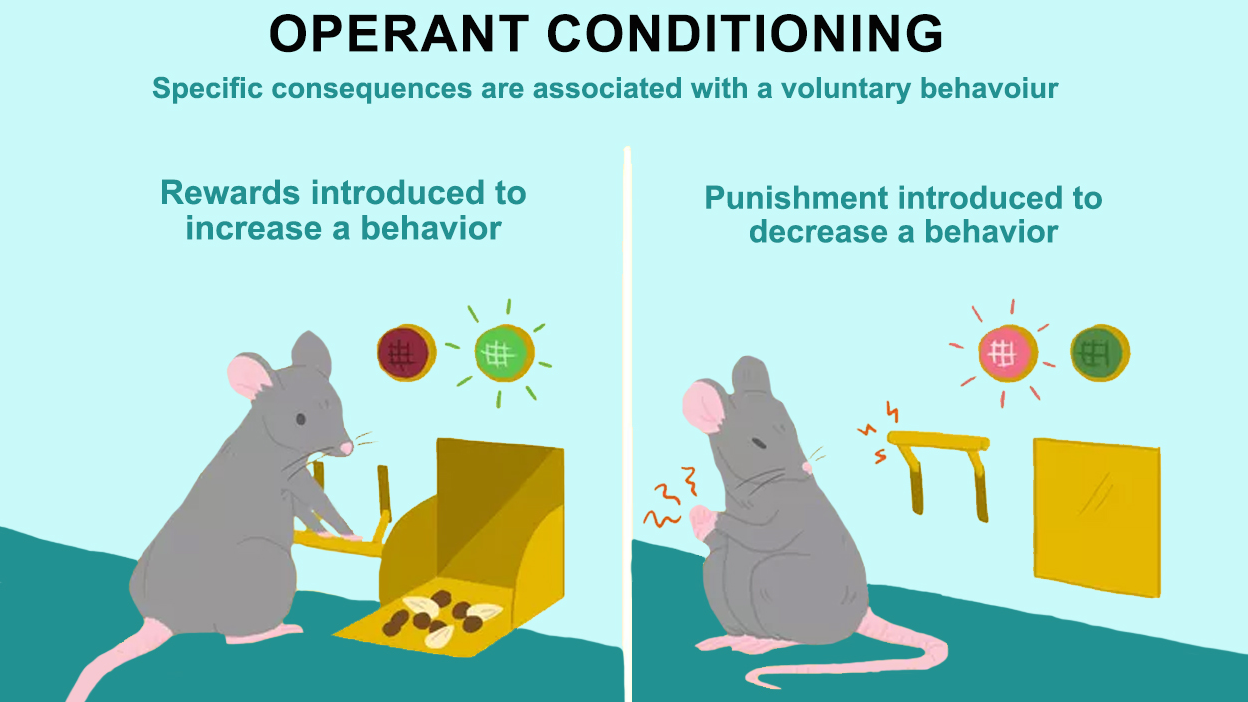Conditioning can be of two types -

Classical Conditioning - Classical conditioning is a learning process that occurs through associations between an environmental stimulus and a naturally occurring stimulus.
An example of classical conditioning would be whenever we are around someone’s cell phone and hear their phone ringing the same as our phone, we reflexively reach to our phones and this is due to classical conditioning. Our body shows an unconditional response to the conditional stimulus.

Source - https://cdn2.psychologytoday.com/assets/styles/manual_crop_1_91_1_1528x800/public/field_blog_entry_teaser_image/2018-10/adult-busy-cellphone-1083622.jpg?itok=lcxgt1xo
We all get the desire to eat at a specific time of a day, say Lunchtime, even though sometimes, we are not hungry. Similarly, most of the time when we pass through a particular restaurant or cross a food street, we automatically develop a desire to eat rather, even though we do not feel hungry. This is also due to classical conditioning.

Source - https://psychestudy.b-cdn.net/wp-content/uploads/2017/11/now.jpg
- Give some examples of classical conditioning from your life.
Classical conditioning involves forming an association between two stimuli resulting in a learned response.

Source: https://www.verywellmind.com/classical-conditioning-2794859
There are three basic phases of classical conditioning -
Phase 1: Before Conditioning -
The first thing we need for classical conditioning is a natural stimulus. When we hear a sound, our brain automatically becomes attentive. This is a naturally occurring stimulus.
During the first phase, the unconditioned stimulus (UCS) results in an unconditioned response. For example- You become attentive and check your phone when it rings. The phone ringing is an unconditioned stimulus and your checking it is an unconditioned response.
After UCR AND UCS, we also need a neutral stimulus (stimulus that brings no effect yet). When your friend’s phone starts ringing, you don’t reflexively go for your phone. So, that would be a neutral stimulus.
Phase 2: During conditioning
Now, assume you buy a phone the same as your friend’s, that would mean that your phone will have the same ringtone as your friend. The first time it rings, you won’t reflexively go for your phone because you’re still not used to this new stimulus.
But after a couple of days, when you have become much more familiar with your new phone and its ringtone if you hear your friend’s phone ringing, the first thing you would do is check for your phone. Because now, your neutral stimulus has become your conditioned stimulus.
Hence, the during conditioning phase involves pairing a neutral stimulus with an unconditioned stimulus. Eventually, the neutral stimulus becomes the conditioned stimulus.
Phase 3: After Conditioning -
In the after conditioning phase, the conditioned stimulus alone triggers the conditioned response.
This means, after conditioning, whenever you hear your friend’s phone or a similar phone ringing, even if it is far away, the first response of your brain would be to look for your phone.
Operant Conditioning - Operant conditioning argues that one’s behavior will depend on different situations. People will repeatedly behave in a specific way from where they will get benefits.
On the other hand, they will try to avoid a behavior from which they will get nothing. Skinner argued that creating pleasing consequences to specific forms of behavior would increase the frequency of that behavior.

Source - https://images.ctfassets.net/vrrt8fsfwf0e/5UbB85wKszfJFObMdy3GXQ/6242c19dadcc1f3008185da744836299/Skinners_ideas_on_behavioral_perspectives_on_personality_Art_1.svg.png
Hence, two principal terms influence operant conditioning:
- Reinforcements (Positive or Negative): Increase the rate of behavior.
- Punishments ( Positive or Negative): Decrease the rate of behavior.
In Positive reinforcement, one gets rewarded for a certain kind of behavior; with this, the probability of continuing good behavior increases. For example - A student tends to complete his/her homework daily because he/she knows that he/she will be rewarded with a candy or praise. A child may learn to clean his/her room regularly; because he/she will be rewarded with extra TV hours every time he/she cleans up.

Source - https://pixfeeds.com/images/20/496790/1200-496790-134127279.jpg
Negative reinforcement tends to take away something unpleasant, which is acceptable and helps in strengthening the behavior. For example - Children will follow rules strictly to avoid being nagged by the teachers or parents. So, to avoid nagging, the child might end up following the rules strictly.

Source - https://advergizefiles-bragboxx.netdna-ssl.com/wp-content/uploads/check-out-supermarket-kid-candy-today-tease-151209_0c18ca15b7c3fb7ed158f0f465b6cbd6.jpg
One such example of operant conditioning would be if a student is praised or complimented, he/she will be encouraged to do well, but if the student is laughed at or criticized in front of everyone, the presentation will be nothing more than just a formality in future.


